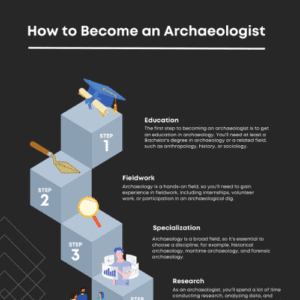How to Become an Archaeologist

| How to Become an Archaeologist Infographic (Digital) | How to Become an Archaeologist Infographic (Print) |
- Education: The first step to becoming an archaeologist is to get an education in archaeology. You’ll need at least a Bachelor’s degree in archaeology or a related field, such as anthropology, history, or sociology.
- Fieldwork: Archaeology is a hands-on field, so you’ll need to gain experience in fieldwork, including internships, volunteer work, or participation in an archaeological dig.
- Specialization: Archaeology is a broad field, so it’s essential to choose a discipline, for example, historical archaeology, maritime archaeology, and forensic archaeology.
- Research: As an archaeologist, you’ll spend a lot of time conducting research, analyzing data, and writing reports. You must be skilled in research methods, data analysis, and writing.
- Networking: Networking is important in any field, and archaeology is no exception. Attend conferences, join professional organizations, and connect with other archaeologists in your field.
- Continual learning: Archaeology is a constantly evolving field, so it’s crucial to stay up-to-date with the latest research, technologies, and methodologies. Consider pursuing a Master’s or Ph.D. degree to deepen your knowledge and expertise.
- Field tools: When working in the field, there are several tools that an archaeologist uses. These include shovels, trowels, brushes, measuring tapes, and more.
- Laboratory tools: Archaeologists also use various tools in the laboratory, such as microscopes, computers, and other equipment, to analyze samples and data.
- Preservation: As an archaeologist, you’ll need to be skilled in preserving artifacts and sites using specialized techniques to protect fragile artifacts and sites from damage or degradation.
- Ethics: Archaeology is an ethical field, and it’s important to adhere to ethical standards when conducting research and handling artifacts. Ethics includes respecting cultural heritage, obtaining proper permissions, and correctly documenting and preserving artifacts and sites.
Becoming an archaeologist requires education, fieldwork, research skills, networking, and a commitment to continual learning and ethical practices.

Archaeology: The New Expedition



